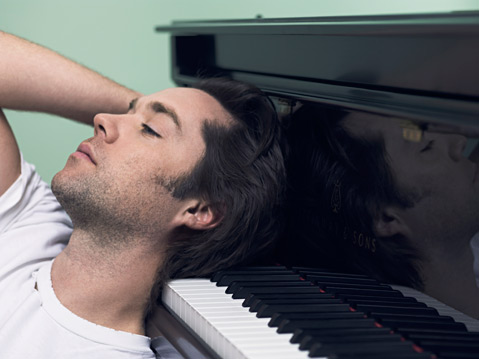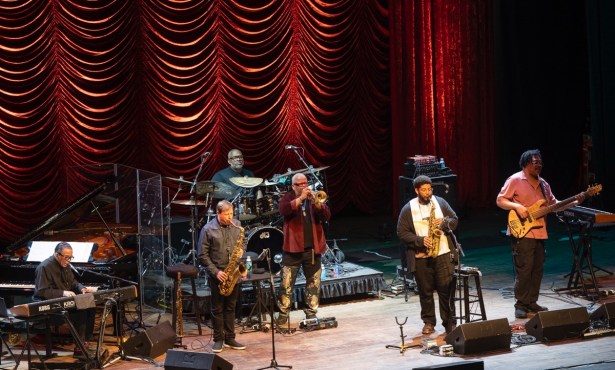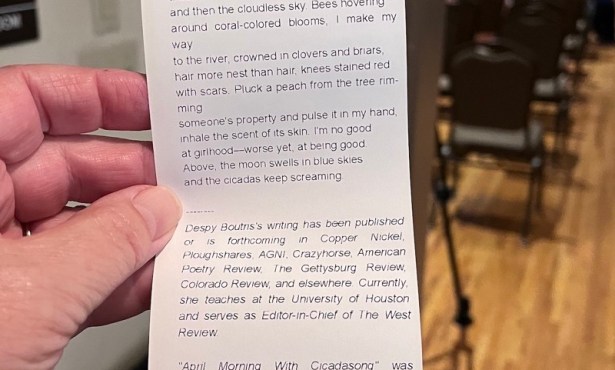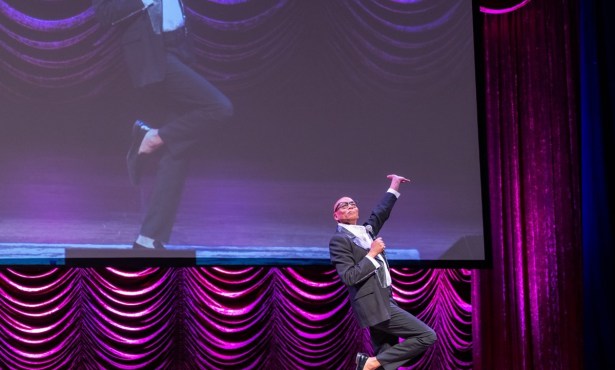Rufus Wainwright Makes a Welcome Return to Pop Music
The Singer Takes the Stage at UCSB in Support of Out of the Game

It’s been a busy couple of years for Rufus Wainwright. In between writing his first opera and staging a production of Shakespeare’s sonnets, the singer welcomed his daughter, Viva, with friend Lorca Cohen, married his longtime partner Jorn Weisbrodt, and said good-bye to his beloved mother, singer Kate McGarrigle. The triumphs and tragedies all make their way onto Out of the Game, Wainwright’s recent and stunning seventh studio album. Produced by dance-music mastermind Mark Ronson, Out of the Game is undoubtedly Wainwright’s most adorned outing yet, pairing the singer’s rich tenor with a host of special guests and layers of instrumentation. This Tuesday, Wainwright returns to Santa Barbara for a solo show at UCSB’s Campbell Hall. I recently caught up with the singer to talk about Ronson, his mother’s passing, and the road ahead.
Can you tell me a bit about your headspace going into Out of the Game? I was definitely in the deep end for awhile there, treading water and surviving. And I didn’t drown. I made it! Whether it was dealing with critics or dealing with conductors, when you’re doing classical music or high-end theater, there’s nothing easy about it. So when I came back to work with Mark on the new record, I was definitely in the mood for some good old silliness and fooling around and rocking out and letting go, and enjoying the company of people my age who weren’t necessarily educated at Juilliard. And I definitely got that. I understood that there’s a reason I’m a pop musician, and it’s because it’s more fun. It took me 30 years to figure that out. [Laughs.]
How did Mark come into the picture? Were you friends beforehand? I knew him; I’d run into him at parties over the years. We have a lot of friends in common, especially Sean Lennon. We’re both very close with him, but we hadn’t necessarily chummed about. But after spending a couple of days together on the album, and then going out and enjoying the fruits of New York City, we were like two long-lost brothers. We couldn’t get over the fact that we hadn’t spent more time together over the years. We kind of fell in love with each other, and by the end of the album, I was in tears; I was completely devastated because I had had such a lovely time and it was such a nice respite from all that I’d been going through concerning my mother.
How did he compare to producers you’ve worked with in the past? I’ve worked with some amazing producers — Marius de Vries, Jon Brion, Pierre Marchand. I will say that Mark, in terms of ability and how to make your way around a studio and deal with musicians and engineers, he’s as good as all of them. They all have their separate methods. But Mark, in terms of being a charmer, a sex symbol, a fashion plate, a hair miracle — he just blows everybody else out of the water. Never has somebody so charming or fashionable or glamorous entered my life. It was really like jet-set time, and that’s not too hard to enjoy. He’s got that thing. It’s pretty formidable. He’s a star.
For you, how does Out of the Game fit into the discography? It’s so hard to judge today. For one thing, the record industry has completely collapsed in terms of selling records and what’s on the radio and what’s on MTV; it’s all pretty much flatlined into this weird televised talent show. That being said, the shows have been amazing, and I think the album is really important and does have a lot of life ahead of it. I feel a bit like a guerilla warrior or something in this jungle of crap, and that’s okay. That also just falls under the heading of a real artist.
Is it disheartening to make pop music in this day and age? It can be. But I also have to step back and say wait a minute; I just toured Australia and New Zealand to packed houses and I’ve played the Folies Bergère in Paris and the Hollywood Bowl. I’ve made it. It’s just making bucketloads of cash to support your lawyers that becomes a problem. I think everything’s fine.
Now that you’re a husband and a dad, do you think there’s a balance to be found between family life and pursuing music full-time? I don’t know. It’s funny, my mom definitely gave up most of her career to raise her children, and my father went out and sacrificed a lot of his family life. That being said, they both ended up in kind of the same place. [Laughs.] Yeah, my mom was always a bit frustrated that she hadn’t gone all the way, and my dad was always sad that he wasn’t around more to be with his kids, but I think it’s really all up to the songs. This question of can a woman have it all — the career and the kids and whatever — it really depends on the songs you write. It’s the quality, not the quantity, you know? My mom’s attention to detail and her incredible inspiration and romantic power was just as strong as my father’s relentless study of every type of human nature. So, I don’t know. Anything is possible.
What’s next? I definitely want to write an opera. I always want to work with [my sister] Martha because she’s probably one of the greatest living singers on the planet. I want to follow out this record now and keep hitting it, so I’m still on this horse. Otherwise, with my mother’s material, there’s a film we made called Sing Me the Songs That Say I Love You, which is a concert film of my mom’s works with Antony Hegarty and Norah Jones and Jimmy Fallon and Emmylou Harris, and we’re promoting that a lot. It hasn’t been released commercially, but it’s doing all the festivals. And I think singing my mom’s songs with my sister would be — I’m going to be doing a lot of that in the near future.
4·1·1
UCSB’s Arts & Lectures presents Rufus Wainwright in concert at UCSB’s Campbell Hall on Tuesday, October 9, at 8 p.m. Call 893-3535 or visit artsandlectures.sa.ucsb.edu for tickets and info.



